Interview with Isabel Cotarelo
 Isabel Cotarelo is definitely an amazing woman over 50! A young artist, full of dreams—and a fellowship—she came to the United States from Argentina when she was in her 20s. Please join me in learning about Isabel’s adventures in self-reinvention in art, family, work, and food!
Isabel Cotarelo is definitely an amazing woman over 50! A young artist, full of dreams—and a fellowship—she came to the United States from Argentina when she was in her 20s. Please join me in learning about Isabel’s adventures in self-reinvention in art, family, work, and food!
Isabel, a wonderful cook and cooking teacher, shares some of her favorite recipes just in time for the Thanksgiving season—her favorite. And don’t forget to check out her website: https://isabelcooking.com. You may even want to attend a class!
We met up for this interview at a pub in NYC. The beer was great. The food, better than average. The conversation—delightful. Join us in the middle of a lively discussion about social media!
Isabel: Instagram makes more sense to me than Twitter.
Diane: Oh, Instagram.
Isabel: Because probably I will get into fights with people if I spend time on Twitter.
Diane: Oh, I’m sure. It’s very easy. Do you have an Instagram account?
Isabel: I have two actually.
Diane: Oh. You take pictures of your food?
Isabel: Yeah. I have one that is for the food life, landscapes, trips, and stuff like that @icventure. And the other one is for my art @isabelcotarelo.art
“My Life is a Constant Expression of Reinventing Myself”
Diane: I wanted to interview you because you’ve done so many interesting things in your years on this planet. Can you tell us a little bit about your background, how you came here, where you landed?
Isabel: Well, I guess my life is a constant expression of reinventing myself.
Diane: That fits perfectly.
Isabel: Let’s go back thirty-something years. I was a young artist trying to develop my art and make a living in Buenos Aires, Argentina, where I grew up.
I think since the moment I was born, I wanted to leave Argentina. I didn’t feel like I belonged there. I wanted to travel. I won a fellowship from the Exxon Corporation while I was still doing my master’s in fine arts and I came to New York.
Standing in the corner of Houston and Broadway, at the wall by Forrest Myers with a friend of mine during a trip to New York in the 70’s, I said, “I am going to live here.” I did live in SOHO for 30 years.
But when I won the fellowship and came to New York, everybody thought that I would be back in six months.
“They Gave Me a Round Trip Ticket and a Good Amount of Money with No Strings Attached”
Diane: You didn’t ever come back?
Isabel: I did go back to visit.
Diane: You came to visit but you never looked back. That was it?
Isabel: That was it.
Diane: So what was the fellowship?
Isabel: They gave me a round trip ticket and a good amount of money at the time with no strings attached. They told me to make some contacts with galleries.
Diane: You were on your own in New York.
Isabel: I was on my own.
Diane: How old were you.
Isabel: 26.
Diane: Okay. Was that thrilling? Scary?
Isabel: I was so excited about it. And I wanted to leave Argentina so…
Diane: So, it was perfect. Did you know anybody?
Isabel: My mom’s second cousin lived in the U.S. I landed in her apartment and stayed for about a week. I remember having a recurring nightmare in which I woke up and found myself back in Buenos Aries.
She lived a block away from the Metropolitan Museum. So that was nice. I had one friend who had gone to art school with me. So I had that connection.
Diane: And how was your English?
Isabel: It was terrible. I grew up speaking French. I mean I knew ‘Hello, how are you’ but …
Diane: You couldn’t have a conversation, like a real conversation.
Isabel: No. I rented a very tiny loft in Green Point, when I arrived in February. I felt like I was in Warsaw, because it was Polish neighborhood.
Diane: Oh, that I didn’t know.
Isabel: It was fascinating to me. There was the Polish butcher and bakery. And it was very industrial because all these loft buildings, they were on the river. Or the canal, I don’t know what it was. I actually liked the feeling.
“That Was During the Time People Wanted Paintings to Match Their Rugs. I Remember Mauve Was Very in Vogue”
Diane: And what did you do with your days?
Isabel: What did I do? I was able to connect with people at the Metropolitan Museum. They were training me to be one of the volunteers who do guide tours in Spanish. They have that.
Diane: I didn’t know.
Isabel: And because I have a background in the arts.
Diane: You were a perfect fit.
Isabel: Yeah, so I was doing that and my art and trying to meet people. I made a connection with an interior designer. That was during the time people wanted paintings to match their rugs. And I remember mauve was very in vogue.
I had to do these paintings with swatches of colors…
‘They Were Huge, Abstract Paintings with Splashes and Different Geometric Shadows”
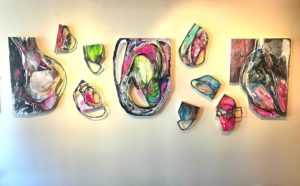 Diane: You were commissioned to paint according to the fabric.
Diane: You were commissioned to paint according to the fabric.
Isabel: Yeah.
Diane: Or the wallpaper or whatever?
Isabel: Yeah. That is what I did. I didn’t sign my name but, you know, it paid the rent.
Diane: I remember shapes were really big then, like what kind of paintings…
Isabel: They were huge, abstract paintings with splashes and different geometric shadows.
Diane: I remember those. I had one.
Isabel: Okay, well maybe I did it.
Diane: Maybe you did, but I didn’t match so perfectly.
What was the kind of art you wanted to do?
Isabel: Well at that time, I also did abstract paintings. But they were very analytical, geometric paintings. Very rigid and with not much color. It wasn’t splashy.
Diane: Was it an exciting time for you?
Isabel: It was very exciting.
You know when you 26, 27 you don’t have any money. You have to do whatever kind of work to support yourself. So, I started assisting a woman who had a catering service.
That’s where I learned about catering.
“I Come from a Family of Very Strong Women Who Cook Very Well”
Diane: Where you interested in cooking before?
Isabel: Well I always cooked.
I come from a family of very strong women who cook very well. In Argentina, there is a lot of meat. People eat meat and potatoes, salad, and pasta. But at home, we had a variety of food that we made every day.
Diane: Did you enjoy working for the caterer?
Isabel: It was interesting. She was a British woman who had flew airplanes in WWII in England.
Diane: She flew planes?
Isabel: I don’t even remember her name actually. And I don’t remember how she ended up in the States. But she had her own plane, like a little Cessna.
Diane: Really?
Isabel: I think it was a Cessna, whatever. She had it in a mini airport in somewhere in Westchester.
And she had a lot of caterings outside of New York—in Virginia, Maryland, Washington, DC. We’d have to fly in that little thing, and I am panic, I mean…
Diane: You’d fly with her, with the food? Wow that is hysterical.
Isabel: Yeah, I really…
Diane: It was scary?
Isabel: Yeah. I didn’t enjoy flying in those little planes. But it was an experience.
Diane: It sounds like an experience! Were they fancy parties?
Isabel: Yeah, Yeah, Yeah. They were very nice. And I got to travel to difference places.
“I Wanted to Learn to Speak English. So, I Got an American Boyfriend. That Was the Best Way to Practice”
At that time, I was living in Roosevelt Island. The subway didn’t go to the island then. You have to take the tram. I had a few shows in small galleries.
Diane: Good, nice.
Isabel: I wanted to learn to speak English. So, I got an American boyfriend. That was the best way of practicing.
Diane: That’s the way to learn, right?
Isabel: I was working in another gallery that actually catered to interior designers.
My job was to recruit people who would paint the paintings on commission.
I was there for a while. At the same time, I started working at The Door. Do you know what The Door is?
Diane: No.
Isabel: The Door is a nonprofit organization that used to be right here on 6th and 21st street. It helped teenagers get GEDs and taught English as a second language. They also had a health clinic. It was the time of AIDS, so there was already a lot of work with that, and also there was a huge number of kids coming from Guatemala, El Salvador, because of the Civil Wars happening there.
I was doing intake and trying to figure out what to do with these kids.
The Door is now actually in downtown Manhattan and they continue doing a fabulous job.
Diane: That’s interesting. I always like to hear about organizations doing good work.
“We Became Very Good Friends. Until We Stopped Being Friends and Became Romantically Involved”
 Isabel: n the meantime, I became very good friends with the man who is now my husband.
Isabel: n the meantime, I became very good friends with the man who is now my husband.
But we weren’t romantically involved. We met because he is also from Argentina.
Diane: Oh he is, but you met here?
Isabel: Yeah. We met at an exhibit that we were both hanging work for at the Argentinian Consulate in New York.
Diane: So, he is an artist too?
Isabel: Yes. We became very good friends. Until we stopped being friends and became romantically involved.
Diane: Now that’s the best way to do it.
Isabel: I think so.
Diane: How long have you been married?
Isabel: Well, married. I mean the fact of being married…
Diane: Or been together?
Isabel: We have been together for 34 years.
Diane: Nice!
Isabel: A long time.
Diane: It is. We’ll talk.
Isabel: But I have known him…
Diane: Forever.
Isabel: Yeah.
Diane: Do you speak Spanish together or English? Both? Mix and match?
Isabel: We mix.
He came to this country in the 70s when he was 18. He practically grew up here.
The same with the kids. We speak both languages. I mean they only speak English to us but they understand …
Diane: They understand everything.
“We Were Creating a Happening.”
Isabel: So, Daniel—that is my husband. Daniel and another fellow Argentinian artist and myself, we were creating a happening.
Diane: “Happening.” I love it.
Isabel: It included a gigantic painting that we did together, a sculpture, and music that we collaborated on. This happening was on Halloween night on 1986. I was already pregnant with my first child. I didn’t want to get married.
Diane: Why not?
Isabel: Because I came from a family of divorced women. I always said that I would never get married. It was my principle. So he proposed to me and I said, “No.”
And in the meantime, I am living with him and having a baby.
Diane: Yes, uh huh.
Isabel: So, the story goes that I couldn’t (maybe we don’t have to put this in the writing), I couldn’t renew my visa anymore, so we had to get married.
Diane: I think that is wonderful, but if you don’t want it in here, we don’t have to put it in here. (Isabel decided to keep it in—after a good, long laugh!)
Isabel: So, the joke always goes that I only got married because of the papers.
Diane: I love it! You are so entertaining. I am having the best time hearing your story.
Isabel: Thank you. So, I got married because of the papers and after 35 years I am still married because of the papers.
We have 3 children.
Diane: Wonderful.
Isabel: So, after the first child, it was very difficult because I had postpartum depression.
Diane: Tell us about that. Postpartum depression is still under the radar in some ways.
Isabel: I was suicidal.
Diane: Oh boy.
“I Knew What it Meant to Be Depressed and Devastated and Feeling Hopeless”
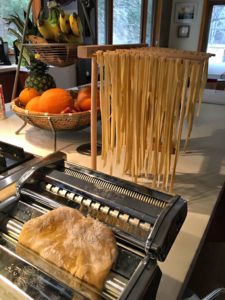 Isabel: I came from a family with a bipolar disorder through generations.
Isabel: I came from a family with a bipolar disorder through generations.
Diane: Who doesn’t?
Isabel: At the time, we didn’t know it was bi-polar. But nowadays we call it bi-polar.
I had a few episodes of deep depression in my teens. I knew what it meant to be depressed and devastated and feel hopeless. Having a child that you actually have to take care of. And I didn’t have any family. I didn’t have anybody.
Diane: It’s such a transition, even if you do.
Isabel: Even though I am the youngest of three sisters, with a big difference in age. So my…
Diane: What’s the difference?
Isabel: Well 9 and 12. My sisters were marrying when they were like 22 and I have my older niece is 51.
So, I was used to being around babies. But it’s one thing to have nieces and nephews and another to have your own.
Diane: And you have to wake up in the middle of the night.
Isabel: But I must say I was lucky that I have a very good father in my husband who took the night shift.
Even though I’m a liberal woman, when I had my first child, I didn’t want to use my last name because it’s a difficult last name. So, we used my husband’s last name, Lopez – L-O-P-E-Z – which is a very Spanish last name.
My husband, in his wisdom, said he didn’t want our children to be put in a bracket of being Hispanic because of their last name. So, he actually changed his last name.
Diane: Wow.
Isabel: So they have a double last name, which is Lopez-Venture, but here, they drop the middle one. They are all Ventures, a created last name to protect them.
Diane: Is that what you felt you needed to do for your children?
Isabel: It may sound prejudiced or snobby, but actually, I feel they are more protected because of that.
Diane: It sounds like Mama Bear, Papa Bear, this is what you do for your kids in this crazy society.
“I Lived in Argentina During the Military Process Where, If You Were Young, Chances Were That You Would Disappear”
Isabel: Especially nowadays. It’s crazy, it’s scary.
But you know I lived in Argentina during the military process where, if you were young, chances were that you would disappear.
Diane: Really? I didn’t know that history.
Isabel: Basically, we had a democratic government. This was ’75 or ’74, I can’t remember. There were some guerrillas working against the government, so the military took over.
They were looking for Communists, Socialists, people who were basically supporting Peron, who was in Spain. The fact that you were young, and in the university, made you a target. It was a terrible time, where you had to be aware of everything—whom you talked to, what you said. You didn’t know if you’d come back at night or if you’d disappear. I had friends who disappeared.
I chose to come here because I thought it was the ideal democracy.
Diane: Is what’s going on at the border terrifying you?
Isabel: Everything. I grew up with a mom who was a Communist. She hated the idea of me coming to this country.
Somehow, the institutions used to work in this country. The checks and balances worked. What is making me afraid, I’m freaking out, I don’t see that the checks and balances are working anymore, and this president, can, in a stroke of his big signature, change the Constitution.
Yeah, the border is driving me bananas. Basically, this is a country of immigrants. If anything, the tribes are the only ones who own this place. I’m an immigrant, but everybody else is first or second generation.
Diane: I’m first generation. What is going on today scares me tremendously, too.
So … tell me how the cooking started.
Isabel: Well, this is, again, is about reinvention. When I had Ivan, my older son, in ‘86, I was about to exhibit in a really good gallery in the Lower East Side when those galleries were important. And I was doing work that I thought was really good. But a man who I knew, who was one of the gallery’s artists, put a bad word about me in the gallery, about my work. Like “she doesn’t know what’s she’s doing. She’s copying this and that.” And because the gallery showed his work and they made money from him, they dropped me. I really felt very lost. Because at that point it was my identity.
“I Created a Catering Business That Provided Four Meals a Week to People. Sort of a Blue Apron … About 20, 30 Years Ago”
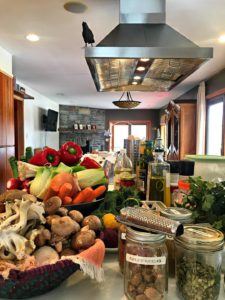 Diane: And this is when you were still depressed?
Diane: And this is when you were still depressed?
Isabel: I had passed the depression. I was pregnant with Veronica.
So, I said, that’s it. I can’t do this. And realized… I mean, you’re a writer. You know how much it takes of your emotional time to put out something half decent. It’s the same when you paint or do any creative stuff.
I said I can’t do this anymore. So, what am I going to do? I didn’t want to go to school. I was lost. But I’m a very hyper person. I have to be active and doing something productive.
So, I created a catering business that provided four meals a week to people. Sort of a Blue Apron or one of those meal services. I’m talking about 20, 30 years ago.
Diane: Wow. How did you think this up?
Isabel: I don’t know. It’s one of those epiphanies that came to me on the playground with other mothers. Everybody complained about cooking.
In my mind I said, all these American ladies don’t know how to cook, so I figured out what to do. I cooked four meals, one pasta, one chicken, one vegetarian, and one other thing. And then I put about four portions in containers and delivered them on Thursday or Friday. The orders came in on Tuesday and I cooked for two days, with the baby hanging from the backpack.
Diane: In your home kitchen?
Isabel: In my home kitchen. I sent the menus through the fax. That evil machine, the fax. Then a non-profit organization called Trust Land, whose offices were a couple of blocks from my loft in Soho, asked me if I could come twice a week to cook lunch for their employees.
From there, I had few catering jobs. You know, weddings, stuff like that. I reached a point where I had to either expand or fall. And at the same time, I knew this wasn’t for me.
Diane: You didn’t want to make it your life.
“So, We’re Dealing with Therapists, Special Ed Services, and I Realized There Is Not Much Help for Parents with Kids Who Have a Magnitude of Issues”
Isabel: I did it for a few years and it helped financially. At the same time, you know how parallel things happen. My older son, I knew something was wrong with him.
And sure enough, he’s severely learning disabled. I mean, he’s really smart, but he’s severely dyslexic. And he had attention deficit. Then we realized he’s also bipolar. Okay, the whole thing. In Argentina, I used to teach art to kids, so I’m used to their developmental stages. So, we’re dealing with therapists, special ed services, and I realized there is not much help for parents with kids who have a magnitude of issues. He’s 32 now, so I’m talking about 30 years ago when these weren’t as popular as they are now.
I decided to become a counselor. At first, I thought about art therapy. But I realized I would only get a job in a hospital setting, which isn’t a setting that I like. I wanted to be in a school and have the same vacations that my kids have.
I applied to NYU for counseling, and NYU rejected me.
Diane: Their loss.
Isabel: So, again, my husband, always a positive and encouraging person, said “Send them a letter. Tell them they don’t know what they are missing.” And that’s what I did. And they accepted me.
Diane: That’s wonderful.
Isabel: And they gave me a scholarship.
Diane: That’s wonderful.
Isabel: I was scared to go back to school, because I was 37.
Diane: Old lady.
Isabel: Well, I felt like I was old. And I thought NYU was a fabulous place. To my surprise, NYU wasn’t all that…
Diane: Rigorous.
Isabel: After two years I got my degree. And I was very proud.
Diane: Absolutely, you should be.
Isabel: I realized I didn’t want to work for the Board of Education because I didn’t want to work in high school. I wanted to work with the little ones, but guidance counselors are not mandated in elementary school.
Very few schools will hire counselors. So, I got a job in an agency. I made very good friends with the people working there, and I’m lucky to still have them in my life.
“One Day, While I Was Taking a Shower Before Work, I Thought, What If I Go and Talk to the Principal and Tell Her She Needs Me in the School as a Counselor?”
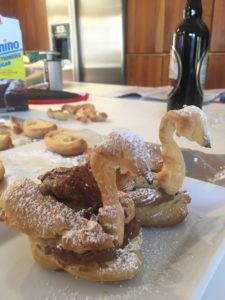 Diane: That’s wonderful.
Diane: That’s wonderful.
Isabel: And I grew up a lot. At some point, they changed the direction of the agency. And I didn’t like the people who took over.
The agency was housed in a Catholic school in the Lower East Side. We provided services to the school, a tiny middle school for girls. One day, while I was taking a shower before work, I thought, what if I go and talk to the principal of the school and tell her that she needs me in the school as a counselor? So, I did that. And she hired me.
Diane: Great.
Isabel: I was there for five years, also. But always in the back of my mind is the artist.
I was always doing creative stuff. I made costumes for the kids. I baked elaborate cakes for their birthday parties. But it was always in response to serving the family—not directly doing my art. I would start some drawing, some painting, but nothing really clicked. And I wasn’t happy with anything I produced.
At some point while I’m working in this Catholic school, they hired a principal I couldn’t stomach. That was when I applied to the DOE (Department of Education).
Isabel: They offered me a job to start the Monday right after Thanksgiving. And by this time, it’s 10 days before Thanksgiving. I go home, and I say to my husband “What do I do?” And he said, “Take it.”
I’m a very emotional person. I get attached to situations. But at the same time, I’m adaptable. So, I told them, and I left on a Wednesday before Thanksgiving. And on Monday I was working in the Board of Education.
Diane: Wow.
Isabel: I knew that job would be my retirement job. I actually I put in writing that when I turned 50, I wouldn’t do anything that I didn’t want to do.
Diane: That leads me to another question. What do you think about turning 50 and beyond? How is that for you?
Isabel: Oh my god. I turned 64 in July. So, it has been 14 years.
Diane: Happy birthday.
“I Do Take Cooking Classes When We Travel. So, It Added to My Repertoire”
Isabel: Thank you. And it has been a 14-year roller coaster. There were many things happening.
I, for the first time in my life, was making a decent salary. Plus, the health insurance for the entire family. I felt incredibly good. At the same time, the kids were getting older. It was that freedom of action.
Diane: Excellent.
Isabel: Like, my husband and I could go on vacation for a week and leave them. You know, a friend would come and stay with them. It was a liberation.
Isabel: In the 14 years since I turned 50, I traveled a lot. I love to travel. And I do take cooking classes when we travel. So, it added to my repertoire.
Diane: So each place you learn some recipes from that area?
Isabel: Yeah. Taking cooking classes in other places teaches you about different techniques, spices and ingredients, but, for me the most interesting aspect, the culture, traditions and history of that area. You can also learn how environmental and political changes made people adapt those old recipes into what we enjoy today. It’s fascinating.
My husband and I started a project in Mexico in 2006. We bought a large piece of land on the Pacific coast, in the area of Oaxaca. And we were making a development, until 2008 happened.
“Mexico’s Like the Man You Really, Really Loved … But He Breaks Your Heart”
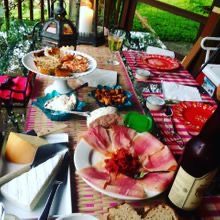 Diane: Timing, right? You bought the property before the crash?
Diane: Timing, right? You bought the property before the crash?
Isabel: We bought it before and put everything there. It was a combination of multiple depressions. The global economy plus the personal loss.
Diane: What was the personal loss?
Isabel: Money!
Diane: Oh, oh, got it. Do you still have it?
Isabel: We still have the land, but
Diane: You didn’t develop it.
Isabel: And I wouldn’t.
Diane: Not now?
Isabel: Not ever. I want to sell the land. Mexico’s like the man that you really, really loved, you know, that happy love, but he breaks your heart and leaves a scar. You keep going, but it’s difficult.
We invested a lot, emotionally and financially. I love Mexico, but that’s history now.
Diane: I love Mexico too.
Isabel: I love the culture, I love the food, I love the colors, I love everything about Mexico.
When that happened, being the inventive person I am, I decided I was going to make some extra money. I offered Friday night pasta dinners in the loft.
“Some People Began Asking, ‘Can You Do It on a Saturday? I Want to Celebrate My Birthday …’
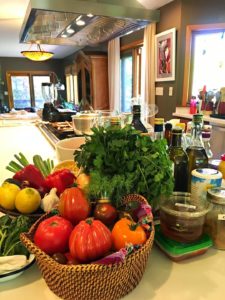 Like a cooking club, kitchen club, restaurant club, menu club. Every Friday, I had 12 people come in for a little appetizer, a pasta dish, and a glass of wine. The people came at eight. They left at 10:30.
Like a cooking club, kitchen club, restaurant club, menu club. Every Friday, I had 12 people come in for a little appetizer, a pasta dish, and a glass of wine. The people came at eight. They left at 10:30.
Some people began asking, “Can you do it on a Saturday? I want to celebrate my birthday …” So, I started doing that. During one of these dinners that I enjoyed tremendously, a person asked me, “Why don’t you teach cooking?” And I said “I can do that. Would you come to a cooking class?” They said “Yeah, I would.” And I said “Okay, let me think about it.”
And a few months later, I decided… because I had taken cooking classes, I know how to make the lesson. And as you can see, I can be entertaining and tell stories and be agreeable.
Diane: Yeah, absolutely.
Isabel: So, I created menus and had classes once a month.
Diane: That’s great. What’s it called?
Isabel: Cooking at Isabel’s House. I’ve been doing them for 10 years.
Diane: And you do it in Kingston, now?
Isabel: Now I do it in Kingston.
Diane: That’s wonderful. What made you move to Kingston?
Isabel: Well, that’s part of whole other story. So, my husband and I, lived for 26 years in a loft in Soho.
Diane: You owned it or rented?
Isabel: We rented it. There were 5 families in the building. The building was originally owned by two artists who lived in the second and 3rd floors and rented the other three floors. These two men died.
One of their daughters inherited the whole building. We wanted to buy the apartment. She didn’t want to sell.
The building didn’t have a CFO. It was falling apart. And basically, we kept the building going. I cleaned the stairs. We helped her take care of the boiler. That kind of New York story.
Fast forward to 2015 or 16. She sold the building to a group of investors, who bought us out.
Diane: They gave you money to disappear.
“I Fell in Love with the Hudson River”
Isabel: It all coincided with me retiring. I decided at 62 that it was time. I didn’t want to work anymore. I had other things to do while my health was okay. In 2016, my middle sister died. And three years before, my other sister died. I was like okay, I’ve got to enjoy life.
After you live in a loft, it’s very hard to get used to living in an apartment. So, I needed to live in a loft or a house. But lofts in the city were outrageously expensive.
Since I first came to New York in the 70s, I fell in love with the Hudson River.
Diane: It’s gorgeous.
Isabel: My dream was to have an apartment, all glass, facing the Hudson River.
Diane: Hey, that’s a good dream.
Isabel: I said, if I’m not working anymore, I don’t need to be in the city. I can be somewhere else.
Diane: That’s right.
“The Lake. I Have a Little Lake”
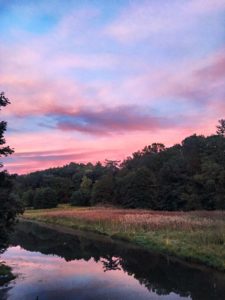 Isabel: I mean, I still wanted to live in New York, and I wanted to have some relationship with the Hudson River. So, we started looking in the Hudson Valley, and this house came up. It has these tremendous windows that are not facing the Hudson. They are facing a lake.
Isabel: I mean, I still wanted to live in New York, and I wanted to have some relationship with the Hudson River. So, we started looking in the Hudson Valley, and this house came up. It has these tremendous windows that are not facing the Hudson. They are facing a lake.
Diane: What lake?
Isabel: The lake. I have a little lake.
Diane: Oh, you have a lake. They’re facing “my lake.”
Isabel: Daniel and I have this impulsive decision making when it comes to properties.
Diane: We must be related.
Isabel: Really?
Diane: I think so.
And Daniel likes the Catskills too?
Isabel: My husband, he just needs a nice place to stay happy.
Diane: Whatever makes you happy. What do you do with the snow?
Isabel: I have somebody who…
Diane: You have someone plow. That’s what I did.
Isabel: Yeah. We also have a new business. We bought an orange orchard in Costa Rica four years ago. So, in January, we go to Costa Rica.
Diane: How do you find an orange orchard in Costa Rica? How does that even happen? How does that even enter your…
Isabel: Okay, this is how it happened. After Mexico …
Diane: Went bust.
Isabel: We still had an idea of doing something.
Diane: You didn’t lose the dream.
Isabel: Of doing something abroad.
So we started traveling in Central America. And Costa Rica is the most desirable place to invest because it’s very stable…
In 1940 there was an attempt … a coup d’état. It didn’t happen. They crushed it. And the president at the time, along with the congress, changed the constitution and abolished the army. Costa Rica is the only country that doesn’t have an army. The money they save goes to other services. Education, health, the environment. And they didn’t go through all the terrible civil wars that the rest of Latin and Central America went through.
To tell you the truth, I don’t like Costa Rica.
Diane: You don’t?
Isabel: It has no poetry. I mean, sorry, if a Costa Rican is listening to me. But they were not the center of a large civilization. Otherwise, it’s beautiful. But I need some art.
Diane: But they have oranges.
Isabel: They are great for the oranges. And the nature is unbelievable. I mean, really it is a reservoir for species. And they are teaching the world. You know, they have no zoos. They don’t have animals captive in zoos. You cannot hunt in Costa Rica. They are really environmentally conscious.
At some point, we decided to take six weeks to tour Costa Rica. The roads are the worst, the worst you can imagine. But we learned about Costa Rica. And people are very nice. And we learned that because of climate change, the orange production in Florida and California is going bad. But in the hills in Costa Rica, the temperature is good for oranges. And it’s a new crop.
Diane: Who would have known?
Isabel: Tropicana and all these big producers buy their oranges there to make their concentrate.
Diane: You sell to Tropicana?
Isabel: We’ll have the first harvest this December.
Diane: Good luck.
Isabel: Thank you.
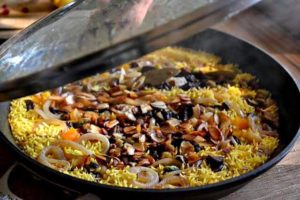 Diane: Very exciting. You’re both crazy.
Diane: Very exciting. You’re both crazy.
Isabel: Yes. Yeah.
Diane: Usually it’s one and there’s another to balance, but you’re both off the chain.
Isabel: Well, he taught me to be positive.
Diane: I think that’s wonderful.
Isabel: I don’t say that I’m retired, I say I graduated.
Diane: I love it.
Isabel: Because retired sounds like you’re going to die.
I said I graduated from that part of my life. So, I did something different. Imagine 26 years in a 4000 square feet loft that you have to move.
Diane: Your loft was that big?
Isabel: Yeah, it was huge.
Diane: Oh, wow.
Isabel: And my kids lived there. And not only my kids, all their friends.
Diane: How big is your house now?
Isabel: 6000.
Diane: 6000?
Isabel: Yes. It’s huge. I have three floors.
Diane: What do you two do in it? What does one do with 6000 square feet? Do you have to furnish that whole place? I have to come to your house.
Isabel: Come and take a cooking class!
Diane: I’d love to.
Thanks so much for speaking with me! It’s been such a pleasure, laughing with you! And now, you’ll leave us with our special treat—some recipes!
*****These two recipes will be in my Vegetarian Thanksgiving class*****
Jeweled Rice
This recipe serves 6 people
1 1/2 C. White Basmati Rice
½ C. Black Rice
Salt
6 TBSP. Unsalted Butter
1 Large Onion – Thinly sliced
1/4 tsp. Saffron Threads – Crumbled and soak in ¼ C. warm water
½ tsp. Ground Cinnamon
½ tsp. Ground All Spice
½ tsp. Ground Pepper
1 tsp. Ground Cumin
1/3 C. Dried Apricots – Chopped
1/3 C. Golden Raisins or Currants
1/3 C. Dried Cranberries
1/3 C. Slivered Almonds – Blanched
1/3 C. Pistachios – Chopped
Cook Black rice following package instructions minus 10 minutes and set aside. Rinse Basmati rice several times in cold water until it runs clear and drain. Rinse the rice several times in cold water until the water runs clear. Drain. In a large pot, bring 9 cups of water with 1TBSP. of salt to boil. Add the rice and boil for about 5 minutes, stirring a few times. Drain the rice very well in a colander.
In a small skillet heat 1 TBSP. butter. Add the onion and a pinch of salt and cook until soft. Add 1 TBSP. saffron water to onion and cinnamon, allspice, black pepper and cumin. Cook for 1 minute more. Add apricots, raisins and cranberries. Set aside. Combine Basmati rice and Black rice.
Melt 4 tablespoons butter in a heavy-bottomed enamel or nonstick Dutch oven over medium heat. I’ll use a paella pan. Spread half the rice combination on the pan. Spread onion-fruit mixture on top of rice. Add the remaining rice. Leave the pot on the stove burner for about 5 minutes. Do not stir or move the rice. You will have to smell if the rice has browned. Sprinkle remaining saffron water over rice and cover the pot. Lower heat to very low low and leave undisturbed for 30 minutes. Turn heat off and let it rest for at least 10 minutes.
Melt 1 TBSP. of butter in a skillet over medium heat. Toast almonds and pistachios for about 1 minute. Set aside.
To serve, spoon the rice into a platter. With a spatula, lift the bottom and place the crusty side up on top of rice. Top with toasted almonds and pistachios.
Brussels Sprouts and Figs
This recipe serves 6 people
4 Tbsp. Olive Oil
1 1/2 Lb. Brussels Sprouts – Stems trimmed, thinly sliced
1 1/2 C. Dried Figs – Stem removed and thinly sliced
Salt and Fresh Ground Pepper
2 tsp. balsamic Vinegar
In a large skillet heat oil over medium heat. Add sliced Brussels sprouts and figs. Sautéed for a few minutes and add ¼ C. of water and salt and pepper. Cook without stirring until sprouts and fig are tender, about 5 to 10 minutes. Turn the heat to high until the rest of the water evaporates. Remove skillet from heat. Adjust seasoning, add Balsamic vinegar and mix.
As Always, I’d Love to Hear Your Thoughts! Please Leave a Comment or Send Me an Email!
See you Friday November 15th!
Diane



Hello,
I’m Isabel, the interviewee, I’m presently visiting Buenos Aires, my navel, my crib. Once again I’m confronted by the determination and resilience that most women have in this country to continue pushing forward in the middle of adversity which is an everyday currency. I’m, I guess, made of that stock.
Your comments, that I just read, made me tear a bit out of gratitude for your understanding, encouragement and solidarity of spirit. Thank you.
That is your stock, my dear! Enjoy the navel, and thanks again for sharing your story!
Hello Dear Friend,
I loved the interview. So much of it I knew, but so much I didn’t. I can still hear your voice and your laughter. Such good memories of you and Daniel and your family. Definitely need to take a class soon. Sending our very best wishes always.
Loved this interview especially since my 4mo old granddaughter is named Isabel(le):-)
Isabel is a brave and beautiful lady who has spread her strength, spirit, determination, talent and creativity to nourish many souls and stomachs!!
Reading it made me HUNGRY;-) for more.. Coincidentally I did attend a cooking class yesterday by a ( mom of young kids ) chef in Long Beach who cooks in her home and delivers meals weekly ..
This also made me think of a great women’s cultural organization where I did attend a class in Queens https://www.leagueofkitchens.com/
which could be an option for Isabel .. if of interest and if location could work ..or to start an outside NYC option.. I see they are hiring.
Thanks for the comment Fran, and congratulations on your Isabelle!
Love that you attended a cooking class yesterday and that the chef/teacher delivers meals while managing young kids. Sounds a lot like Isabel’s path!
I checked out https://www.leagueofkitchens.com. Looks great! I will def pass along to Isabel, if she doesn’t see it here first!
This was such an amazing interview! I can’t believe how many things Isabel has invested in – and I don’t just mean money. I loved reading this and feeling the energy. When she said, “And I grew up a lot” – I murmured to myself that she knew how to thrive – she knew how to present herself and how to listen to her inner promptings, all things I am working towards.
And the recipes! They look fabulous. Thanks for including them!
Yes, Nicky! I hadn’t thought about “investment” like that! Isabel certainly has invested in her own growth and has listened to her “inner promptings.” Inspiring for us all!
A feast of words!! What a beautiful interview and a moving story of how we’re designed to go on after heartbreak, depression, failure, disappointment, to create BEAUTY!!! Brava Isabel!!!
I LOVE the way you put that, Janet, and I couldn’t agree more! Thanks for the comment!